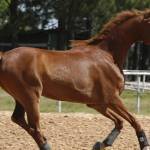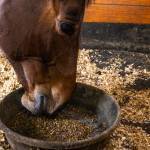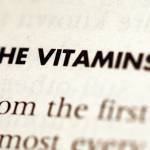How Can Dietary Adjustments Ease Muscle Problem in Horses?

The purpose of this study was to investigate the effect of diet on changes in serum creatine kinase (CK), plasma lactate, muscle lactate, and muscle glycogen concentrations with near-maximal exercise. The experimental diets were composed of adequate amounts of soluble carbohydrate or fat, or excessive soluble carbohydrate.
Mean creatine kinase (CK) activity post-exercise on the high-carbohydrate diet was 1.5 times greater than the fat and low-carbohydrate diet, but this was not significantly different. The changes in plasma lactate and muscle lactate after exercise were significantly higher on the fat diet than the low-carbohydrate diet. Post-exercise muscle lactates were 1.5 times higher on the fat diet than on the low-carbohydrate or high-carbohydrate diet. No significant differences in muscle glycogen were seen between diets.
This study shows diet has a significant effect on muscle metabolism even when fed for a three-week period. CK activity was lowest in Thoroughbred horses susceptible to recurrent exertional rhabdomyolysis (RER) when fed a diet formulated to meet, but not exceed, daily energy requirements using either soluble carbohydrates or fat. The fat diet resulted in higher muscle lactate concentrations in RER horses, though no associated increase in CK was observed.
This report of KER’s 1998 research was published in Equine Exercise Physiology.
Read the entire research paper, titled Effect of diet on the metabolic response to exercise in Thoroughbred horses with recurrent exertional rhabdomyolysis (RER).








